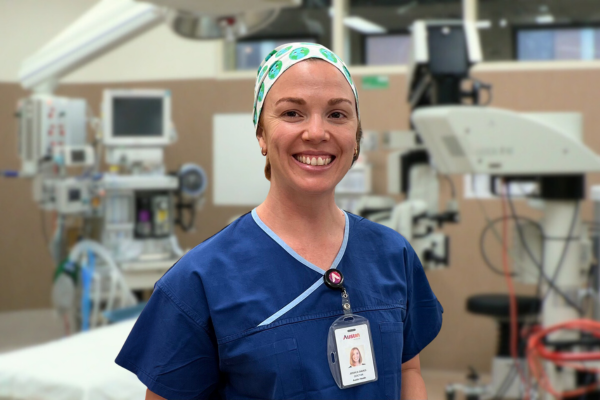About
International Day of Women and Girls in Science: A New Era for Sustainability
- Home
- About
- Latest news
- International Day of Women and Girls in Science: A New Era for Sustainability

12 February 2024
As we celebrate International Day of Women and Girls in Science, we shine the spotlight on Jess, who seamlessly blends her roles at Austin Health with her passion for making a positive impact on the environment.
Jess embodies this year’s theme ‘A New Era for Sustainability’, which empowers women in science leadership to not only improve health but combat climate change.
Jess has worked at Austin Health for almost three years as an anaesthetist, and is also one of the supervisors of training for anaesthesia.
From a young age, Jess was curious about the world and always had an interest in finding solutions to all sorts of problems, whether scientific, creative or both. Initially wanting to follow in her dad’s footsteps and become a vet, Jess changed her mind at the last minute and decided to pursue a career in medicine.
For Jess, medicine has given her a “fantastic insight into people's challenges”, allowing her to not only positively impact lives, but also maintain a varied, interesting and challenging career.
The most rewarding aspect of working in science, according to Jess, is engaging with people. Whether it's collaborating with colleagues or patients, the human connection is at the core of her fulfillment.
“Working with patients to help them feel and be safe during a very vulnerable experience like surgery is incredible, and utilising the technology, pharmacology and physiology knowledge that we have available makes it safer and easier for everyone,” says Jess.
As the co-chair of the Austin Environmental Sustainability Committee, Jess also plays a crucial role in shaping Austin Health’s strategy to achieve Net Zero emissions by 2040. She is currently undertaking a PhD about how health services, and in particular operating theatres, can be transformed to be more sustainable.
For young minds contemplating studies in STEM, Jess imparts a crucial piece of advice: “science and creativity are not mutually exclusive – they can exist side by side”.
“The reason I enjoy research is because it is a way to be creative in my workplace by discovering something new and applying it to a real-life problem (like climate change and health). Likewise, every-day work in STEM can be creative through problem solving and exploring new ways of answering a difficult problem or question.”
Jess adds that studying medicine and undertaking specialist training doesn’t come without its challenges, although it’s very exciting to see a shift in a field that was traditionally male dominated.
“Recent equity data shows that trainee equity is there, and as we train more women anaesthetists, they will filter into leadership and research positions over time.”
Jess says she would love to see the same changes throughout other specialties.
“It is important that our patients are looked after by people who represent them, and that means ensuring medicine and training is diverse and reflects the community we serve.”
To celebrate International Day of Women and Girls in Science, we recognise the fantastic work of women like Jess who inspire us every day, promote full and equal access to and participation in STEM studies, and lead the way in environmental activism.


